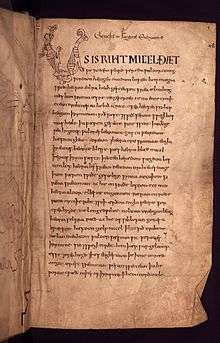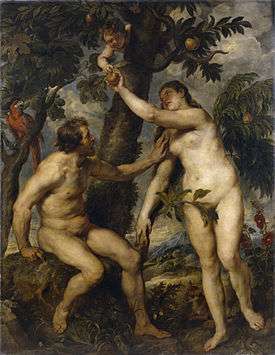Genesis A

Genesis A (or Elder Genesis) is an Old English poetic adaptation of the first half or so of the biblical book of Genesis. The poem is fused with a passage known today as Genesis B, translated and interpolated from the Old Saxon Genesis.
Genesis A (and B) survive in the Junius Manuscript, which has been held in the Bodleian Library at the University of Oxford since 1677.
Summary
Genesis A begins before Biblical Genesis—not with the creation of the world but with the creation of Heaven and the angels and with Satan's war on Heaven.[1] Then the poet describes the days of creation, culminating with the creation of Adam and a description of the Garden of Eden.[2] After this, the poem scholars call Genesis B resumes the story of Adam in the Garden,[3] while also going back to the war on Heaven Genesis A already discussed.[4]
Textual Background
Scholars consider the poem in the Junius manuscript of separate authorship than Genesis B, though both are presented concurrently in the Junius Manuscript.[5] C.L. Wrenn even considers Genesis A to be a composite work.[6]
Scholars such as Wrenn once considered the work to be partially written by Cædmon,[6] though as far back as Laurence Michel in 1947 there were critics: he calls the attribution based on "circumstantial evidence" and that any connection "may be laid to the prevalence of well-known pious introductory formulas".[7]
Editions and translations
The editions and translations of Genesis A include:
- Krapp, George Philip, ed. (1931), The Junius Manuscript, The Anglo-Saxon Poetic Records: A Collective Edition (1), New York: Columbia University Press, ISBN 9780231087650, OCLC 353894 . http://ota.ox.ac.uk/desc/3009
- Doane, A. N. (ed.), Genesis A: A New Edition (Madison, Wisconsin, 1978)
- Aaron K. Hostetter's translation
See also
| Wikimedia Commons has media related to Caedmon manuscript. |
References
- ↑ lines 1-102
- ↑ lines 103-234
- ↑ Genesis B, lines 235-245
- ↑ Genesis B, lines 246 ff
- ↑ Killings, Douglas B. (1 August 1996). "Codex Junius 11". Project Gutenberg. Retrieved 17 March 2015.
This work is generally believed to be a composite of two separate poems . . . The reason for this interpolation is not known. Perhaps the original compiler preferred the version of the story presented in "Genesis B", or perhaps the text of "Genesis A" from which he was working with was missing this section.
- 1 2 Wrenn, C.L. (1967). A Study of Old English Literature. New York: Norton. p. 99. ISBN 978-0393097689.
- ↑ Michel, Laurence (1947). "Genesis A and the Praefatio". Modern Language Notes. 62 (8): 545. JSTOR 2908618.
